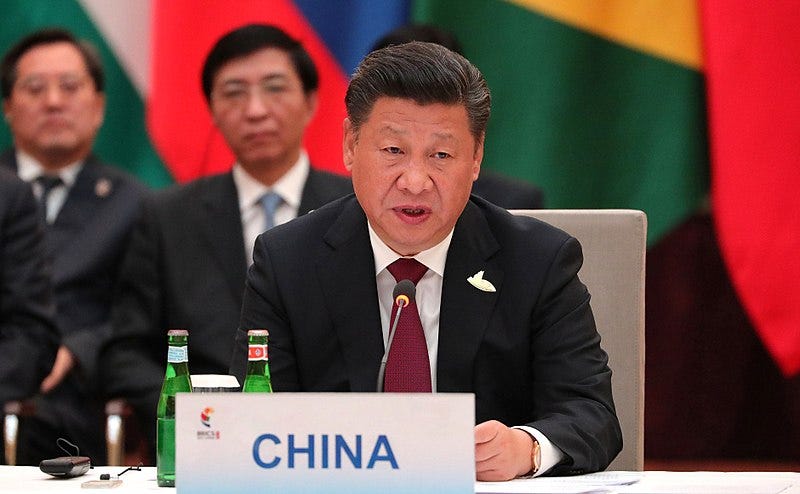Why some German companies are making remarkable profits, despite the pandemic
This newsletter is a 4-minute read
Dear Reader,
No other EU-country is as economically dependant on China as Germany. Not only is this a moral problem, it also poses a strategic risk…
Regards,
Jörg & Axel
Sign up for our members’ newsletter to get our biweekly long-read
Four Things
For many political observers, Health Minister Jens Spahn has come of age during the corona crisis. Once known for making headline-grabbing pronouncements on the excessive English used in Berlin cafes, the ambitious 40-year-old has been calm and considered throughout the pandemic. But his promise last week to provide free rapid tests for all in March has gone down like a lead balloon with the overworked local authorities who’d be expected to distribute them. It’s also put him in the Chancellor’s naughty book. Providing Schnelltests means opening up museums, shops and other businesses - and we all know what the Chancellor thinks of that. After the details of a cabinet meeting were leaked to the press, we now also know what she thinks of Mr Spahn.
The Catholic church in Cologne has been overwhelmed by a wave of exits from its congregation in response to what some are calling “a cover up” of historic sexual abuse by priests. The Archbishop, Cardinal Woelki, is refusing to released a report into such abuse in his diocese, citing “shortcomings in the research.” The report allegedly concludes that 200 priests preyed on children.
Germany’s most influential Islamist preacher has been sentenced to 10 years in jail. Abu Walaa ran the YouTube channel “faceless preacher” and at the height of ISIS terror in Syria he recruited dozens of young men to go to the Middle East to wage jihad. Among his followers at a mosque in the town of Hildesheim was the young Tunisian who drove a truck into a Berlin Christmas market in 2016.
Forests are said to deeply influence the German soul - which isn't good news for the German psyche. A report published by the Agriculture Ministry on Thursday found that the state of German forests hasn’t been so poor since records began in 1984. Several years of drought, plus the invasion of bark beetles, has led to serious damage to the country’s trees. The Ministry has pledged over a billion euros to help foresters adapt their stock to climate change.
Germany has a China problem
Germany’s growing dependency on China is a train wreck in slow motion. While the USA is striving to decouple strategic industries such as semiconductors from what will soon be the world’s largest economy, Germany is being sucked into the vortex that is the brutally strong Chinese economy.
After a year of standstill, China’s economic growth is back with a roar. At eight percent, the Middle Kingdom is expected to expand twice as fast as the EU in 2021.
Fresh numbers from the German Federal Statistics Office show that while exports to the USA slumped by almost ten percent last year, sales to China were stable during 2020.
Within a year or two, the world’s largest dictatorship will be Germany's largest export market and the gap towards soon-to-be second placed America will continue to widen.
The dependency on a country who’s treatment of the Uighur minority has parallels with the darkest parts of German history is not only a moral question, it poses a vast strategic risk to the German economy.
As we reported in January, Germany’s China policy is short sighted. A conflict even larger than the 2018-2020 trade war with the US is inevitable. China is a systemic rival to the EU and a threat to the democratic world order. Xi Jinping swallowed Hong Kong’s democracy in one bite while the world stood by and watched. The president, who is autocratic even by Chinese standards, will not stop there. Taipei is on high alert.
"If German policymakers have to be more firm with Beijing that will have consequences for German industry”, Jürgen Matthes, an expert at the Institut der deutschen Wirtschaft (IW), commented on the matter in the Handelsblatt.
Such consequences can be dire. As a study by the Handelsblatt shows, some of Germany’s largest and strategically most important companies such as Infineon (semiconductors), BMW, Daimler and Volkswagen (automotive) can’t kick their China habit.
How did Daimler, in the midst of the COVID crisis, manage to grow its 2020 profits by an incredible 53 percent? Simple: a third of the Stuttgart group's cars are sold in China. What’s the trick behind Infineon’s 25 percent increase in operating profits last quarter? 40 percent of the semiconductor producer’s business is in China.
Most striking is Volkswagen. When CEO Herbert Diess closed the books on the fourth quarter of 2020, Germany’s largest private employer put the best quarter in its 84-year history behind it. A staggering 41 percent of the company’s revenues are now generated in China.
No other EU country is as dependent on China as Germany. During her 16-year Chancellorship, Angela Merkel has stood by and watched. Moral reasons aside, if or rather when the hangover hits it will be a stinker. But by then of course, Merkel will have long since retired.
A.B.B.
Forward this newsletter to your friends - we rely on you to grow!
Who we are:
Jörg Luyken: Journalist based in Berlin since 2014. His work has been published by German and English outlets including der Spiegel, die Welt, the Daily Telegraph. Formerly in the Middle East. Classicist; Masters in International Politics & Arabic from St Andrews.
Axel Bard Bringéus: Started his career as a journalist for the leading Swedish daily Svenska Dagbladet and has spent the last decade in senior roles at Spotify and as a venture capital investor. In Berlin since 2011.






